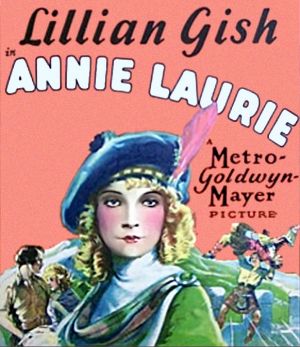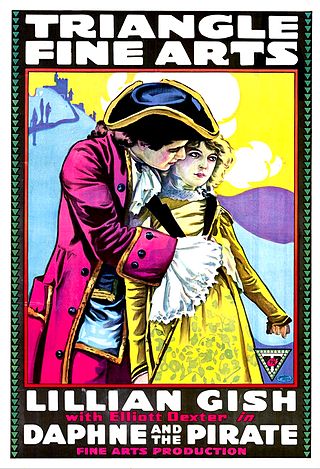Related Research Articles

Lillian Diana Gish was an American actress. Her film-acting career spanned 75 years, from 1912, in silent film shorts, to 1987. Gish was dubbed the "First Lady of the Screen" by Vanity Fair in 1927 and is credited with pioneering fundamental film performance techniques. In 1999, the American Film Institute ranked Gish as the 17th-greatest female movie star of Classic Hollywood cinema.

Dorothy Elizabeth Gish was an American stage and screen actress. Dorothy and her older sister Lillian Gish were major movie stars of the silent era. Dorothy also had great success on the stage, and was inducted into the American Theater Hall of Fame. Dorothy Gish was noted as a fine comedian, and many of her films were comedies.

Robert Emmett Harron was an American motion picture actor of the early silent film era. Although he acted in over 200 films, he is possibly best recalled for his roles in the D.W. Griffith directed films The Birth of a Nation (1915) and Intolerance (1916).

Way Down East is a 1920 American silent romantic drama film directed by D. W. Griffith and starring Lillian Gish. It is one of four film adaptations of the melodramatic 19th century play of the same name by Lottie Blair Parker. There were two earlier silent versions and one sound version in 1935 starring Henry Fonda. Griffith's version is particularly remembered for its climax in which Gish's character is rescued from doom on an icy river.

Annie Laurie is a 1927 American silent romantic drama film directed by John S. Robertson, released by Metro-Goldwyn-Mayer, and starring Lillian Gish and Norman Kerry. It is about the battles of Scottish clans.

Kate Bruce Bryant was an American actress of the silent era, famed for her screen portrayals of mothers. She appeared in more than 280 films between 1908 and 1931.

Gold and Glitter is a 1912 American silent drama film co-directed by D. W. Griffith and Frank Powell. Lillian Gish, in the leading female role, was praised for its variety of emotion, in comparison to her previous roles.
A Cry for Help is a 1912 American drama film directed by D. W. Griffith.
La Bohème is a 1926 American silent drama film directed by King Vidor, based on the 1896 opera La bohème by Giacomo Puccini. Lillian Gish and John Gilbert star in a tragic romance in which a tubercular seamstress sacrifices her life so that her lover, a bohemian playwright, might pen his masterpiece. Gish, at the height of her influence with Metro-Goldwyn-Mayer studios, asserted significant control over the production, determining the story, director, cast, cinematography, and costume design. In February 2020, the film was shown at the 70th Berlin International Film Festival, as part of a retrospective dedicated to King Vidor's career.

The Lost House is a lost 1915 American short drama film directed by Christy Cabanne and starring Lillian Gish.

Daphne and the Pirate is a 1916 American drama film directed by Christy Cabanne and starring Lillian Gish.

Sold for Marriage is a 1916 American drama film directed by Christy Cabanne for Triangle Film Corporation. Its working title was Marja of the Steppes. The plot concerns a beautiful young Russian village girl who is in love with a young but poor boy but whose guardian wants her to marry a rich old man that she does not love. When she refuses, her uncle arranges for her to be sold for marriage in America. An extant film, a copy preserved at the Library of Congress.

An Innocent Magdalene is a 1916 American silent drama film directed by Allan Dwan. It is considered to be a lost film and was added to the National Film Preservation Board's list of lost American silent feature films in February 2021.

The Children Pay is a surviving 1916 American silent drama film directed by Lloyd Ingraham and starring Lillian Gish.
The House Built Upon Sand is a 1916 American drama film directed by Edward Morrissey and starring Lillian Gish. This is a lost film.
Lillian Gish in a Liberty Loan Appeal is a 1918 American silent short film directed by D. W. Griffith. Produced to support the Liberty bond drive of 1918, the film is now considered to be a lost film.

The Greatest Thing in Life is a 1918 American silent drama film about World War I, directed by D. W. Griffith and starring Lillian Gish, Robert Harron, and David Butler. The film is now considered lost as no prints are known to exist.

True Heart Susie is a 1919 American drama film directed by D. W. Griffith and starring Lillian Gish. A print of the film survives in the film archive of the British Film Institute. The film has seen several VHS releases as well as a DVD issue.

Romola is a 1924 American silent drama film directed by Henry King and shot on location in Italy. The film stars Lillian Gish, Dorothy Gish, William Powell, and Ronald Colman, and is based on the 1863 George Eliot novel of the same name.

Remodeling Her Husband is a 1920 American silent comedy film that marked the only time Lillian Gish directed a film.
References
- ↑ "Pathways Of Life – 1916". Lillian Gish 1893. Retrieved July 9, 2020.
- ↑ Affron, Charles (March 12, 2002). Lillian Gish: Her Legend, Her Life. ISBN 9780520234345.
- ↑ "Silent Era : Progressive Silent Film List". silentera.com.